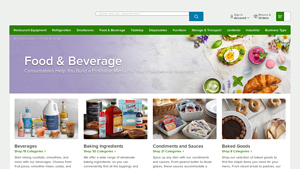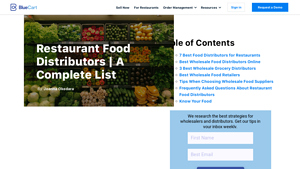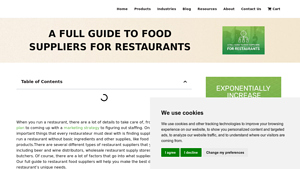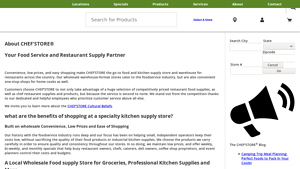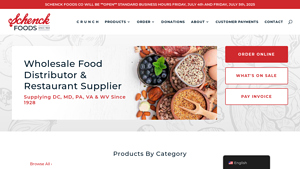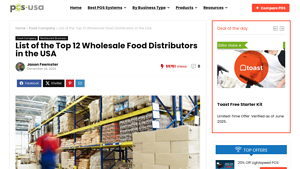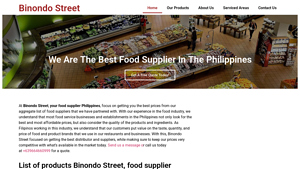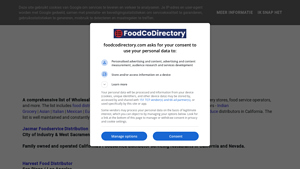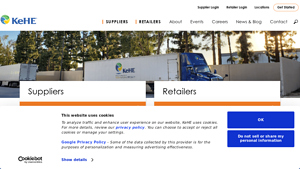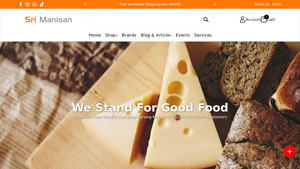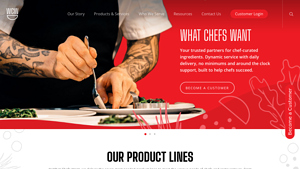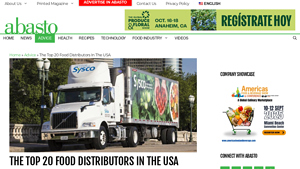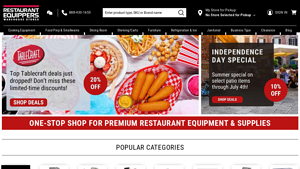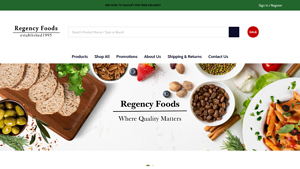Are you struggling to find the right food supplier for your restaurant? It’s a common dilemma: balancing quality, price, and reliability can feel overwhelming. But choosing the right partner is crucial for your success. Imagine having access to fresh ingredients and innovative products that elevate your menu, all while keeping costs in check. The right supplier not only enhances your offerings but also streamlines your operations, giving you more time to focus on what you love—serving great food.
Ready to discover the top 30 food suppliers that can transform your restaurant experience? Dive into our guide and find your perfect match!
Top 15 Food Supplier For Restaurant Manufacturers
Webstaurantstore – Wholesale Food & Beverage Supplies
Domain: webstaurantstore.com
Registered: 2003 ( 22 years )
Introduction: Wholesale food and beverage products for restaurants and foodservice businesses, including a variety of beverages, baking ingredients, and condiments.
BlueCart – Wholesale Food Supply Marketplace
Domain: bluecart.com
Registered: 2001 ( 24 years )
Introduction: BlueCart offers a marketplace for restaurants to source wholesale food and beverage supplies from various distributors, including fresh produce, culinary equipment, and cleaning supplies.
Budget Branders – Custom Disposable Food Service Products
Domain: budgetbranders.com
Registered: 2018 ( 7 years )
Introduction: Budget Branders offers custom-printed disposable products for food service businesses, including custom clear plastic cups, custom napkins, custom deli containers, and custom foil bags.
ChefStore – Kitchen Equipment & Restaurant Supplies
Domain: chefstore.com
Registered: 1997 ( 28 years )
Introduction: ChefStore offers a wide range of food service products including kitchen equipment, restaurant supplies, and food products.
Flanagan – Foodservice Products & Solutions
Domain: flanagan.ca
Registered: 2000 ( 25 years )
Introduction: Flanagan Foodservice offers a comprehensive list of over 10,000 products including fresh meat and seafood, bakery and desserts, beverages, fresh fruits and vegetables, dry grocery, and frozen foods.
Schenck Foods – Wholesale Food Distribution Solutions
Domain: schenckfoods.com
Registered: 2002 ( 23 years )
Introduction: Schenck Foods is a wholesale food distributor and restaurant supplier offering a wide range of products including fresh seafood, meats, fruits and vegetables, dry goods, beverages, baked goods, dairy, desserts, and various disposable and cleaning products.
Posusa – Wholesale Food Distribution Services
Domain: posusa.com
Registered: 2011 ( 14 years )
Introduction: Wholesale food distribution services including fresh groceries, frozen items, cooking equipment, and restaurant supplies.
Binondo Street – Food Supply & Packaging Solutions
Domain: binondostreet.com
Registered: 2021 ( 4 years )
Introduction: Binondo Street is a food supplier in the Philippines offering a variety of food products and ingredients, including paper and plastic packaging, meat, produce, dairy, sugar, rice, and flour.
Foodcodirectory – Wholesale Food Distribution Services
Domain: foodcodirectory.com
Registered: 2021 ( 4 years )
Introduction: Wholesale food distribution services primarily for restaurants, grocery stores, and food service operators in California.
KeHE – Wholesale Natural and Organic Food Distribution
Domain: kehe.com
Registered: 1997 ( 28 years )
Introduction: KeHE is a national wholesale food distributor specializing in natural, organic, specialty, and fresh products. They provide a curated assortment of innovative products to grocery stores, supermarkets, natural retailers, and online eCommerce dropshippers.
Srimanisan – Fine Food Supplier in Malaysia
Domain: srimanisan.com
Registered: 2008 ( 17 years )
Introduction: Sri Manisan Sdn Bhd is a fine food supplier in Malaysia offering a range of frozen and non-frozen food products.
What Chefs Want – Wholesale Food Distribution
Domain: whatchefswant.com
Registered: 2003 ( 22 years )
Introduction: What Chefs Want is a wholesale restaurant food distributor offering a wide range of products including produce, meat, seafood, gourmet items, staples, dairy, and kitchen essentials.
Abasto – Food Distribution Services
Domain: abasto.com
Registered: 1999 ( 26 years )
Introduction: Food distribution services to restaurants, grocery stores, and foodservice operators.
Equippers – Restaurant Equipment & Supplies
Domain: equippers.com
Registered: 1999 ( 26 years )
Introduction: Restaurant Equippers offers a wide range of restaurant equipment and supplies, including cooking equipment such as deep fryers, ovens, charbroilers, ranges, griddles, and food warming equipment.
Regency Foods – Gourmet Food Products
Domain: regencyfoods.com
Registered: 2002 ( 23 years )
Introduction: Regency Foods offers a variety of food products including raw mixed nuts, dry fruits, olive oil, sorbets, gelato, stuffed vine leaves, and cooking wines.
Category Information
The category of “food supplier for restaurant” encompasses businesses and distributors that provide a variety of food products and ingredients essential for restaurant operations. This includes fresh produce, meats, seafood, dairy, dry goods, and specialty items tailored to specific cuisines. Food suppliers play a crucial role in ensuring that restaurants maintain a consistent supply of high-quality ingredients, which is vital for menu planning and customer satisfaction.
Significantly, food suppliers help restaurants manage inventory and costs, often offering bulk purchasing options and seasonal products. They also provide insights into food trends, sustainability practices, and local sourcing, which can enhance a restaurant’s appeal and operational efficiency. Establishing a reliable relationship with food suppliers is essential for restaurants to maintain quality, reduce waste, and ultimately succeed in a competitive market.
Application Information
Food suppliers for restaurants play a crucial role across various industries, ensuring that eateries maintain a steady flow of fresh ingredients. One key application area is in the hospitality industry, where restaurants, hotels, and catering services rely on suppliers for consistent quality and timely deliveries of food products. This ensures that menus can be executed flawlessly, enhancing customer satisfaction. Another significant area is event catering, where food suppliers provide bulk quantities of ingredients for large gatherings, weddings, or corporate events.
These suppliers often offer specialized services, including custom menus and dietary accommodations. Additionally, the healthcare sector utilizes food suppliers to provide nutritious meals for hospitals and care facilities, focusing on dietary restrictions and patient health. Overall, food suppliers are essential in enabling diverse culinary operations, maintaining standards, and adapting to varying customer needs.
Production Process Information
The production process for a food supplier serving restaurants involves several key stages. First, suppliers source high-quality ingredients from farms, fisheries, or manufacturers. This ensures that restaurants receive fresh and safe products. Suppliers often build strong relationships with producers to guarantee consistent quality and availability. Next, the selected ingredients undergo processing, which may include cleaning, cutting, cooking, or packaging. This step is crucial for maintaining food safety and preparing products for easy use in restaurants.
After processing, the food is stored properly to ensure freshness until it is ready for delivery. Finally, the products are delivered to restaurants, where they are used to create meals. Throughout the entire process, suppliers must adhere to health regulations and maintain quality standards to ensure customer satisfaction and safety. This careful attention to detail helps restaurants serve delicious and safe food to their patrons.
Related Video
Frequently Asked Questions (FAQs)
What should I consider when choosing a food supplier for my restaurant?
When selecting a food supplier, it’s essential to consider factors such as reliability, quality of products, pricing, and delivery schedules. Look for suppliers who have a good reputation in the industry and can provide references. Additionally, consider whether they offer local sourcing options, which can enhance freshness and reduce shipping costs. Don’t forget to check their certifications and compliance with food safety regulations to ensure your restaurant meets health standards.
How can I evaluate the quality of a food supplier’s products?
To evaluate the quality of a food supplier’s products, request samples before making a commitment. This allows you to assess the taste, freshness, and overall quality of the ingredients. You can also visit their facilities if possible, to see their operations and quality control processes firsthand. Reading reviews and asking other restaurant owners about their experiences can provide valuable insights into the supplier’s product quality.
What are the benefits of working with a local food supplier?
Working with a local food supplier offers several benefits, including fresher ingredients due to shorter transport times, which can enhance the flavor and quality of your dishes. Local suppliers often provide more personalized service and flexibility in orders, allowing you to adjust quantities based on your needs. Additionally, sourcing locally can improve your restaurant’s sustainability efforts and appeal to customers who prioritize supporting local businesses.
How can I negotiate better pricing with a food supplier?
To negotiate better pricing with a food supplier, start by doing your homework on market prices and competitor rates. Build a relationship with the supplier and express your long-term commitment to their products, which may encourage them to offer you better rates. Don’t hesitate to discuss bulk purchasing discounts or explore flexible payment terms. Being transparent about your budget and needs can also help in finding a mutually beneficial agreement.
What should I do if I have an issue with my food supplier?
If you encounter an issue with your food supplier, the first step is to communicate directly with them. Clearly outline your concerns, whether it’s about product quality, delivery delays, or pricing. Most suppliers appreciate honest feedback and will work with you to resolve the problem. If the issue persists, consider reviewing your contract terms or exploring alternative suppliers. Keeping a record of all communications can also be helpful if you need to escalate the matter.

